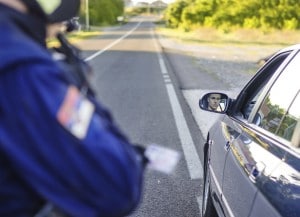
The police don’t have unlimited search rights under California law, but they might not need a warrant in every situation. Here are a few basics you should know about warrants and searches, in case you are ever asked to let a police officer search your car.
When police need a warrant
Thanks to the Constitution, you have the right to be free from “unreasonable searches and seizures.” Most searches require a search warrant, which must be signed by a judge or magistrate. To be valid, the search warrant is limited to a particular place and must describe what the police expect to find, and why they have reason to believe that they will find what they are looking for.
…And when they don’t
If you are being arrested, police do NOT need a warrant to frisk you for weapons. They don’t need a warrant in this scenario because it is done for their own protection. But if the reason is to check for weapons, that is what they are restricted to searching for. If they find anything else incriminating, it might not be admissible in court.
Consent to search
Law enforcement agents can legally ask you for your permission to search you, your car, your home, etc. If you’ve ever been to a big concert or to a pro sports game, you probably had to give consent to have your bags searched before you could enter the stadium. That probably didn’t seem like much of a choice, since you can’t enter the arena unless you allow the search.
If you’ve been pulled over and the officer asks to search your car, you probably don’t feel like you have much of a choice. But in fact, you do. If the officer is asking for your permission, you actually do have the right to say no. You might be worried about the consequences if you say no, but if the officer doesn’t have a good reason to search your car, you don’t have to give your consent.
The vehicle exception
If the officer who stops your car has very good reason for searching your car, because they suspect you have committed a particular crime, then they do NOT need a search warrant. If they have clear, probable cause for believing that they will actually find evidence of that crime inside the vehicle, then they have the right to search it.
That just isn’t the case in an ordinary, routine traffic stop. In that situation, you have the right to say no. But if the officer does have probable cause, then your entire car may be searched, including the trunk. However, you still have some constitutional protections. The search must be within limits of what is “reasonable.” So if you are stopped at the border because they suspect that you are smuggling illegal immigrants, they can’t open containers that are obviously too small to hide a person inside.
Why does it matter if they have a warrant or not?
You might wonder why it really matters. After all, if you’re caught with something stolen or illegal, you’re obviously guilty, right?
Well, no, not necessarily. That’s the beauty of your constitutional right to be free from unreasonable search and seizures. If the police officer didn’t have authority under the law to search you or your property, then no matter what they find, it can’t be used as evidence against you in court.
If this has happened to you
If you’ve been stopped and searched, and are now in hot water, let Chambers Law Firm help you out! Top criminal defense attorney Dan E. Chambers will look at the facts of your case and determine the best defense strategy for your situation. Call 714-760-4088 or email dchambers@clfca.com today for your free consultation.




